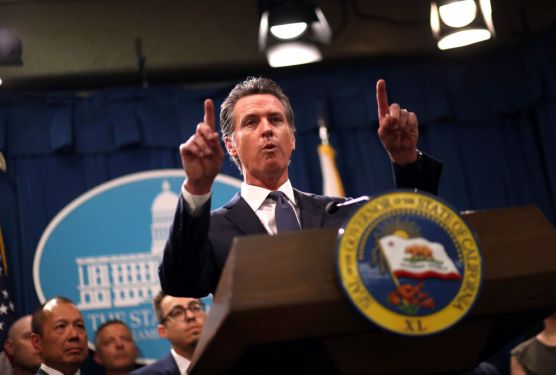California Governor Vetoes Bill Banning Driverless Autonomous Vehicles in Trucks
California Gov. Gavin Newsom Vetoes Bill Requiring Human Safety Operator for Self-Driving Trucks
A Win for Autonomous Trucking Industry
On Friday, California Governor Gavin Newsom vetoed a bill that would have required a human safety operator to be present at all times when self-driving trucks operated on public roads in the state. The move is seen as a win for the autonomous trucking industry, which has been pushing for more lenient regulations.
Background
The California Senate had passed the bill, known as Assembly Bill 316 (AB 316), in mid-September. The legislation aimed to ban driverless autonomous heavy-duty trucks from operating on public roads in the state. However, Newsom argued that existing law provides sufficient authority to create a regulatory framework for the industry.
Existing Regulations
California is already home to some of the strictest autonomous vehicle regulations in the nation. Companies like Waymo and Cruise, which are developing and commercializing robotaxi technology, have had to navigate complex permit processes before testing and deploying their vehicles on public roads. Currently, only light-duty trucks are allowed on public roads.
The California Department of Motor Vehicles (DMV) has been considering lifting its ban on testing autonomous vehicles that weigh over 10,001 pounds in the state. A public workshop held earlier this year prompted lawmakers to introduce AB 316, which aimed to limit the DMV’s future authority to regulate Autonomous Vehicles (AVs).
Industry Backlash
Advocates of the legislation, including the Teamsters union, argued that California should have more control over the removal of safety drivers from self-driving trucks to protect road users and ensure job security for truck drivers. However, AV companies, industry representatives, and chambers of commerce countered that the bill would hinder the advancement of technology that could save lives and limit supply chain innovation.
Newsom’s Veto Letter
In his letter vetoing the bill, Newsom stated: "I’m here today because Gavin Newsom has signaled his intent to turn his back on the safety of 39 million Californians and veto AB 316, not only putting every California driver in danger, but opening Big Tech to eliminating hundreds of thousands of jobs." Mike Di Bene, a member of Teamsters Local 70 in Oakland, expressed similar sentiments.
Newsom also emphasized that he trusts the DMV to continuously monitor the testing and operations of AVs on California roads, suspending or revoking permits as necessary to protect public safety. He further committed to incentivizing career pathways and training workers to equip them with the skills needed to engage with emerging technology.
Long-Term Consequences
The veto may have long-term consequences for the industry. Newsom directed the Labor and Workforce Development Agency to lead a stakeholder process next year to review and develop recommendations to mitigate the potential employment impact of AV trucks. The move acknowledges that the introduction of autonomous vehicles could displace jobs in the trucking sector.
A Shift in Priorities
Newsom’s decision highlights a shift in priorities for California policymakers. While lawmakers had initially sought to regulate the industry, Newsom opted to prioritize technological innovation and economic competitiveness over labor concerns.
The Future of Autonomous Trucking
As autonomous technology continues to advance, the debate over regulation will likely intensify. Companies like Waymo and Cruise are pushing the boundaries of what is possible with self-driving trucks, but safety concerns remain a top priority for policymakers.
Newsom’s veto sets a precedent for how California will approach regulation in the future. The DMV will continue to play a crucial role in ensuring public safety while promoting innovation in the industry. As the state navigates this complex landscape, one thing is clear: autonomous trucking is here to stay, and regulatory frameworks will need to adapt to keep pace.
The Impact on Jobs
While Newsom’s veto may have alleviated some concerns for the industry, it also highlights a pressing issue: job displacement. As autonomous vehicles become more prevalent, workers in the trucking sector face an uncertain future. Policymakers must prioritize worker training and education programs to equip them with the skills needed to thrive in an increasingly automated workforce.
Conclusion
Newsom’s veto of AB 316 marks a significant victory for the autonomous trucking industry, which can now continue to innovate without onerous regulations. However, this decision also underscores the need for policymakers to address pressing concerns about job displacement and public safety as the industry continues to evolve.
As California looks to the future, one thing is clear: autonomous trucks will play a vital role in shaping the state’s transportation infrastructure. Policymakers must balance innovation with caution, ensuring that regulations prioritize public safety while promoting technological advancements.

